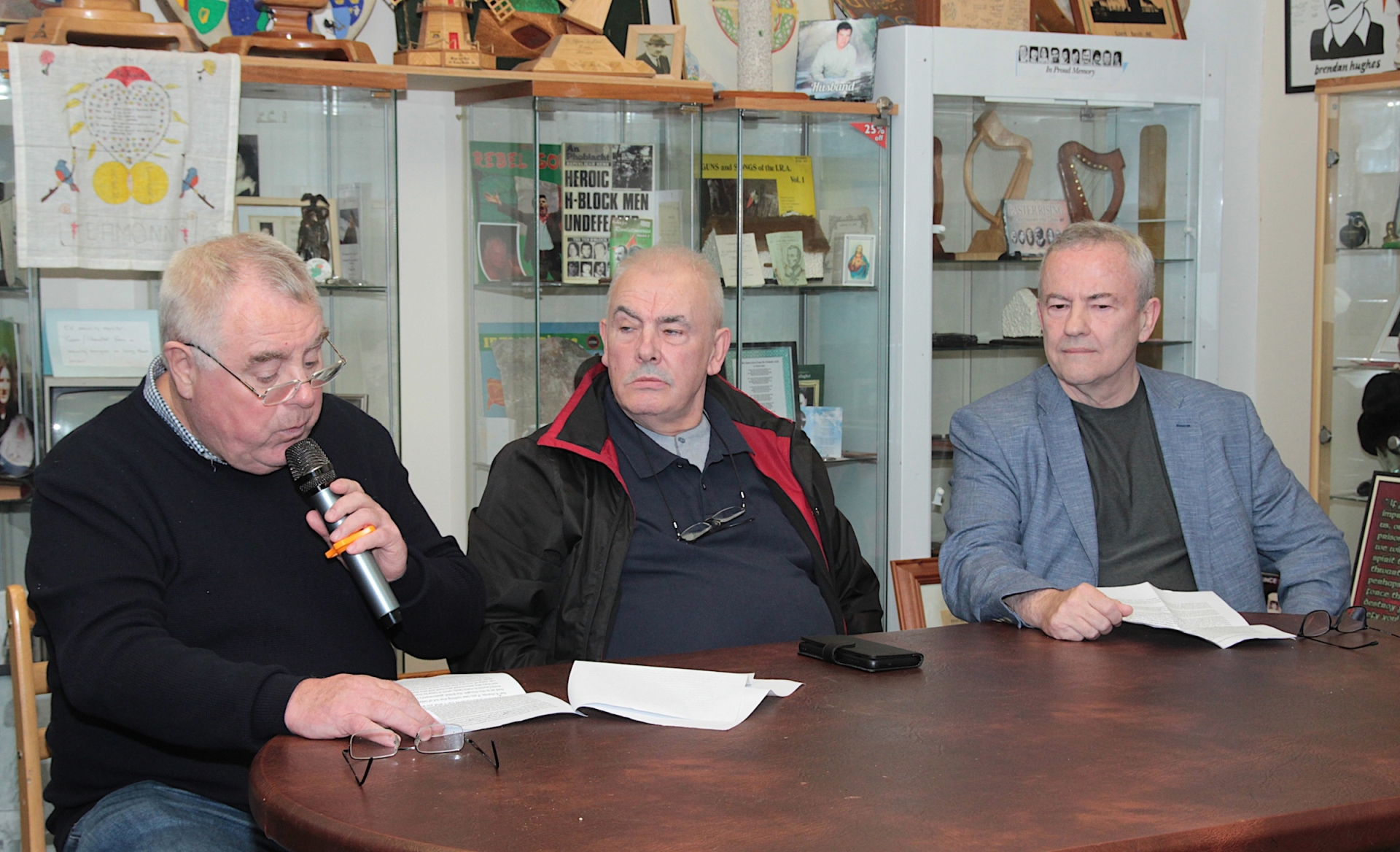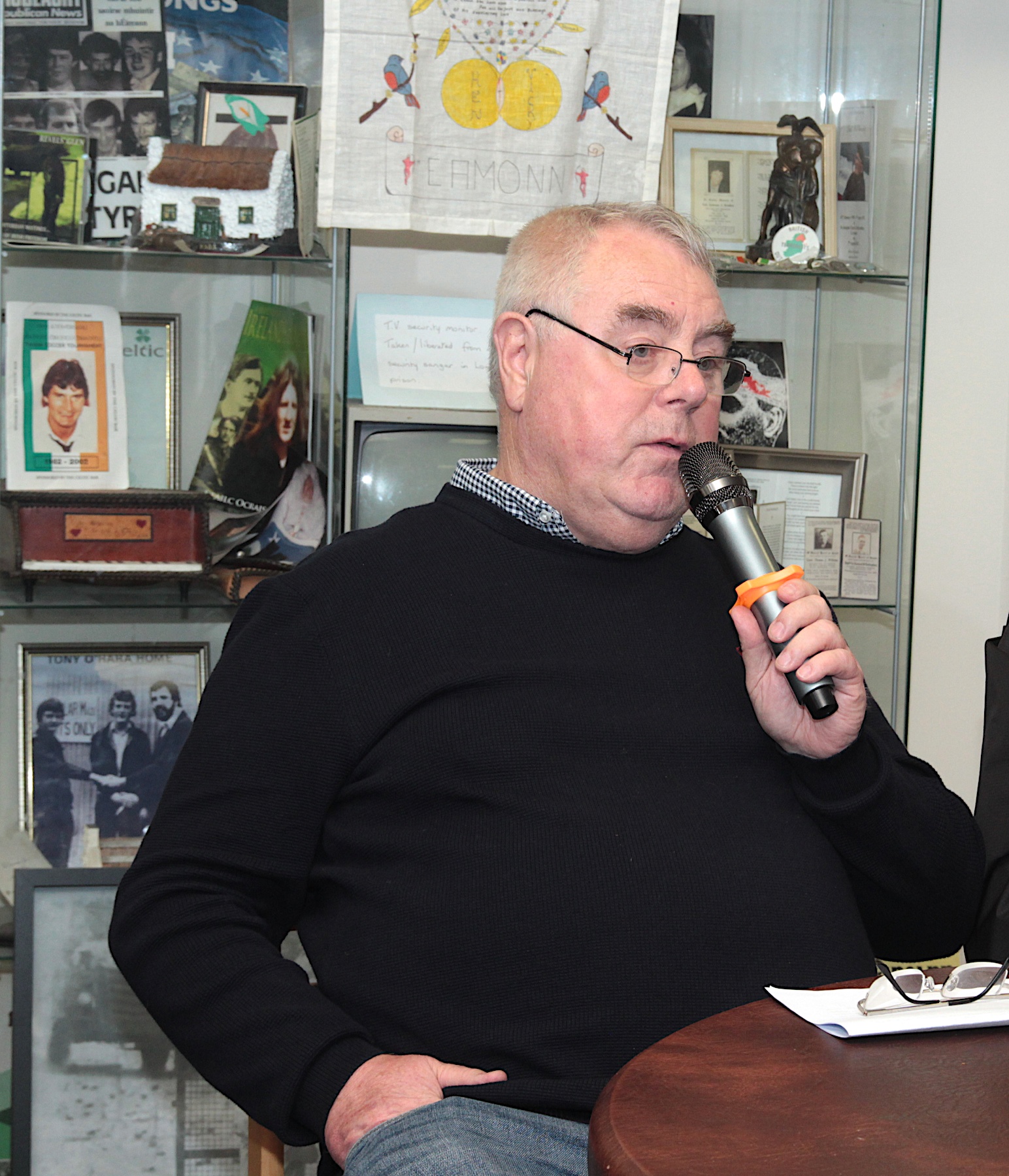
Author Richard O'Rawe with his new book 'Stakeknife's Dirty War'.
With publication of the Kenova report – an investigation into the activities of notorious British agent Freddie Scappaticci - imminent, Richard O’Rawe’s book ‘Stakeknife’s Dirty War: The inside story of Scappaticci, the IRA’s nutting squad and the British spooks who ran the war’ is cogent, comprehensive and well-timed.
As illuminating as it is compelling, ‘Stakeknife’s Dirty War’ is a valuable addition to the literary canon of Irish and British political science - and maybe political psychology, too.
It was US Air Force Lieutenant Colonel Robert Makros who described ‘clean war’ as “the unicorn of armed conflict”. Writing in 2017, Makros said there was “no such thing as a ‘clean war.’”

Author Richard O'Rawe at the Derry launch of 'Stakeknife's Dirty War' with Republican prisoners Dixie Elliott and John Crawley, author of 'The Yank'.
Nowhere is this analysis more accurate than when a methodical and even-handed O’Rawe interrogates the suggestion the British state acted as agent provocateur during the war in the North.
Speaking to this paper before the book’s Derry launch on Saturday, in the Ex-POP Centre in William Street, O’Rawe cited the case of Patsy Gillespie from the city.
In October 1990, Patsy Gillespie and five British soldiers died at the Coshquin checkpoint on the outskirts of Derry when the bomb in the van he was driving was detonated.
O’Rawe said: “There has been a proposition that the British were actually acting as agents provocateurs on many occasions. They were allowing operations, which would kill civilians and outrage the public against the IRA, to go through.
“There is tactical merit in that proposition, but whether there is hard evidence is another matter. I always try to look for the hard evidence, and although there is no hard evidence, both British/Irish Human Rights Watch and Ian Hurst (aka Martin Ingram) are of the same view.
-1696503902585.jpg)
A section of the audience attending the Derry Launch of 'Stakeknife's Dirty War' in the Republican Ex-Prisoners' Centre.
“I interviewed Hurst during the writing of this book. He is an ex-Force Research Unit (FRU) officer and he struck me as a very decent man, a man with a conscience, a man who only spoke out because of his conscience. That is the impression I came away with. And his view was that the British were allowing bad operations to occur again, and again and again in order to outrage the public and alienate the IRA from its support base so it might sue for peace.
“Personally, I think the British were on that road for most of the 1980s. There was a peace corps within the Republican movement; we know that.
“Gerry Adams, Martin McGuinness and the people around them had come to the conclusion the war was unwinnable in a military sense, therefore there needed to be some sort of political approach and I think the Brits embraced that.”
He added: “There is a proposition the British allowed bad operations to go ahead or made sure the operations that went ahead were directed to such a point that civilians were killed and the public would be outraged.
“Patsy Gillespie was one that the British/Irish Human Rights Watch believed was one such operation and I thought it important to mention it in the book.
“British/Irish Human Rights Watch was one such body. On August 28, 2006, it sent a dossier to the PSNI Historical Enquiries Team (HET) in which it alleged British intelligence services may have been the masterminds behind the human-bomb operations.

Author Richard O'Rawe speaking about his book 'Stakeknife's Dirty War' at Saturday's Derry launch.
“The British/Irish Human Rights Watch report said: ‘At least two security force agents were involved in these bombings and allegations have been made that the ‘human’ bomb strategy was the brainchild of British Intelligence.
“Questions arise as to whether the RUC, An Garda Síochána and the Army’s Force Research Unit had prior knowledge and/or subsequent knowledge about the bombings.
“These questions in turn lead to concerns about whether these attacks could have been prevented and why no one has been brought to justice.’”
In ‘Stakeknife’s Dirty War’, Ian Hurst gave the British/Irish Human Rights Watch view credence, commenting: “This report, from a very credible source, brings up the question of informers working at the top tier of the IRA who were allowed to commit crimes up to murder while working for the state.”
O’Rawe believes the information garnered would have gone to the Tasking and Co-ordinating Groups (TCG), set up in the North in the late 1970s.
He explained: “The TCGs were the umbrella intelligence, collating and actioning organisation. It collated all intelligence that was garnered in all the theatres of war in the North, and in Ireland in general, and then actioned it.
“They said, ‘‘Well the IRA is going to be in such and such a place, let’s put the SAS in and we will take them out’. That was the role the TCGs were playing.
“They, I suspect, were certainly controlled by the Ministry of Defence in London and I think it would probably have been discussed at Prime Ministerial level. The policy, in my view, of structuring operations so they would end up being bad operations was allowed to occur.”
O’Rawe suggests TCGs gained some intelligence from covert surveillance.
“The only other avenue was human intelligence,” he said. “In other words, they had agents within the IRA who were privy to operational decisions.”
Asked about media speculation about the involvement of the late Martin McGuinness in this scenario, O’Rawe said: “I am a writer. I don’t give an opinion on it at all. It would not be proper for me to give an opinion.
“What I did do for this book was interview people who had direct contact with Martin McGuinness on a daily basis who were members of the Derry Brigade staff.
“These weren’t ordinary Volunteers on the ground. These were serious, senior members of the IRA in Derry and they had reservations about operations.
“In relation to Franko Hegarty (a Derry man expelled from the IRA for informing), the impression I got from my interviews was that people were absolutely flabbergasted he was allowed back into the IRA.
“They also formed the opinion Martin was the driving force in terms of bringing him back.
“I have to reflect that. I can’t very well say, ‘He was a great guy so I am not writing anything iffy about him’.
“The fact of the matter was these very senior republicans blew a gasket that Franco Hegarty was back in the IRA at the time and they told me they were just ignored.
“Not only was Hegarty allowed back into the IRA, in no time at all he was elevated to the position of Assistant Quartermaster Northern Command.”
O’Rawe emphasised that the Quartermaster Northern Command oversaw all weapons in the North.
He added: “I think it is important to say also, with the exception of one man, none of the interviewees said McGuinness was an informer.
“I wrote up what I was told and the guys were pretty clear. McGuinness behaved ‘very bizarrely' with Hegarty, and Hegarty was so dangerous because he was an informer, an agent. All of that leads to a certain scratching of the head, for want of a better phrase.”
O’Rawe said he included the Hegarty story in ‘Stakeknife’s Dirty War’ only because Freddie Scappaticci brought him up when he was talking to Sylvia Jones for ‘The Cook Report’ broadcast in August 1993.
“Scappaticci savaged Martin on that occasion. I thought that was interesting. I don’t know why he did that because they were good friends at one stage.”
According to O’Rawe, Scappaticci’s mindset and motivation in 1993 might be explained by what a criminologist who recently read ‘Stakeknife’s Dirty War’ described as his possible ‘narcissistic collapse’.
“By August 1993, Scappaticci was off the rails,” said O’Rawe. He was insisting on meeting the British army’s GOC, General John Wilsey, to be reassured he was important.
“He was also talking to families and pretending he was there when people were getting shot dead. He’s all over the place. The criminologist told me what actually happened to Scappaticci was a ‘narcissistic collapse’. I have never heard of such a thing.
“A narcissist is someone who holds himself in the highest esteem. They believe they are the principal person in any room and everyone should look up to them.
“When Scappaticci came back in 1991, having been on the run for two years after the Sandy Lynch affair, he was shunned by the IRA.
“He was actually almost ostracised and that is when he had the ‘narcissistic collapse’ and the result of a ‘narcissistic collapse’ is very irrational behaviour and attempts to reassert your importance.
“That is when he told the ‘Cook Report’ about McGuinness. McGuinness was very clear he wanted nothing to do with Scappaticci and that is probably the reason why Scappaticci had such intense animosity towards him.”
As Johnny Nash once sang, ‘There are more questions than answers’, and that is certainly true of the subject matter of ‘Stakeknife’s Dirty War’.
Among them was, ‘Why did the fact Freddie Scappaticci had a ‘mercurial’ temper, was a known pornography addict, with a penchant for bestiality and an “unhealthy interest in pre-teen girls”, and perpetrator of domestic violence, not speak to his character?’
“The big picture is for someone else,” said O’Rawe. “On a day-to-day basis, the IRA was busy operating: in Belfast, in Ballymurphy, all over, organising snipes, bombs, gun lectures, digging out intelligence.
“People had enough on their plates getting up in the morning to make sure everybody is running coherently and they are safe.”
Perhaps the last word on ‘Stakeknife’s Dirty War’ should go to solicitor Kevin Winters of KRW LAW, who spoke with compassion and empathy at the Belfast launch.
“The deceased here should be remembered just like any other victims of the conflict, and their families should be praised and supported just like any other victims’ families and campaign groups. We always need to guard against the deficiencies in the hierarchy of victimhood.
“Ricky’s book has helped give those families a much needed voice, and for that he is to be commended.”
Meanwhile, Jon Boutcher, the former police chief of Bedfordshire, has been identified as the preferred candidate to become interim PSNI chief constable.
Mr Boutcher has recently been conducting an investigation into the activities of Stakeknife, the Army’s top agent in Northern Ireland during the Troubles.
The Operation Kenova report is expected to be published in the coming months.
A Policing Board spokesperson said: “The board has agreed the appointment of an interim chief constable for the Police Service of Northern Ireland."
Subscribe or register today to discover more from DonegalLive.ie
Buy the e-paper of the Donegal Democrat, Donegal People's Press, Donegal Post and Inish Times here for instant access to Donegal's premier news titles.
Keep up with the latest news from Donegal with our daily newsletter featuring the most important stories of the day delivered to your inbox every evening at 5pm.